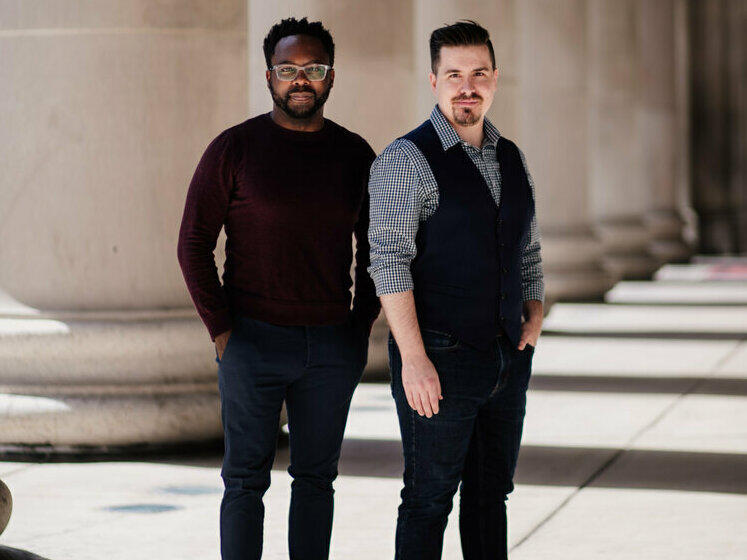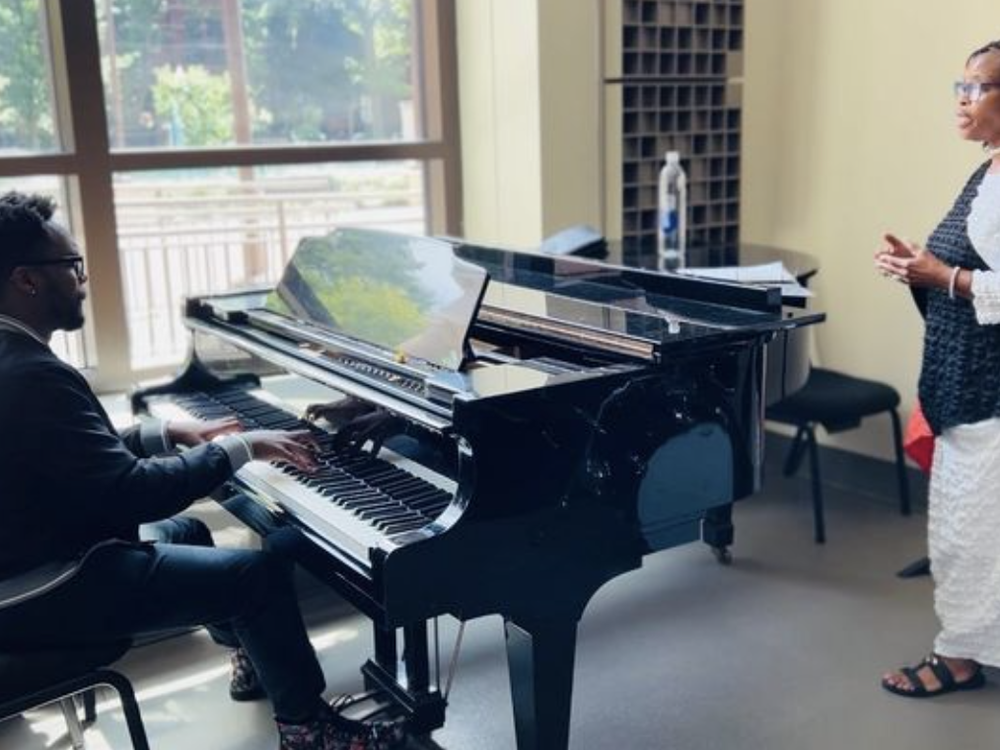Section Branding
Header Content
Baritone Will Liverman celebrates women in new album 'Show Me The Way'
Primary Content
As a child, Will Liverman would listen to cassette tapes from the 1980s and 1990s that his mother had produced in which she sang her own gospel tunes. Those moments are some of his earliest musical memories.
"My mom inspired me musically because of my upbringings in church. She was the lead songstress... and as a result of that, I started singing choir and also got involved in playing piano in the church," the baritone told Morning Edition host Michel Martin.
Liverman says he had always wanted to work with his mom. And when the opportunity finally presented itself, it became the beating heart of a new album celebrating women.
He dreamt up the project in the early days of the pandemic in 2020 with pianist Jonathan King, who accompanies him on the album
"We were kind of sitting around wondering what was going to become of the world," Liverman said. "I thought of my mom, who was my biggest inspiration growing up."
Show Me The Way features five world-premiere recordings by living composers commissioned by Liverman, including new song cycles by Jasmine Barnes and Libby Larsen. Star singers J'Nai Bridges and Renée Fleming also make appearances on the album, out on March 8, International Women's Day.
The album is a bit of a companion to a Grammy-nominated album showcasing Black composers in 2021. That same year, Liverman sang the lead role in Terence Blanchard's Fire Shut Up in My Bones, whose original production was the first of an opera by a Black composer at the Metropolitan Opera. Liverman and the rest of the cast won a Grammy for a Met recording of the piece. This season, he sang the lead role in X: The Life and Times of Malcolm X at the Met.
On the latest album's final track, Terry Liverman sings while her son plays piano in their joint arrangement of Alma Bazel Adrozzo's "If I Can Help Somebody." Gospel groups have recorded the hymn, which was also reprised by mainstream artists like Tennessee Ernie Ford and Doris Day.
Terry Liverman's voice soars with the lyrics "No, my living shall not be in vain" in a soulful interpretation on top of her son's jazzy chords.
A Sable Jubilee sees Tesia Kwarteng's first commissioned libretto hailing Black joy, loosely associated with a movement of resistance, resilience and reclamation. It's set to a layered and uplifting score penned by Barnes, a young composer who Liverman calls "the future of opera."
In terms of the song cycle's themes, Liverman said he was looking for a break with the often told stories of Black pain.
"We wanted to showcase Black joy, just like what it means just to be Black and have that be enough," he added.
Larsen's Machine Head: Ted Burke Poems, meanwhile, takes inspiration from the eponymous San Diego-based poet, critic and bookseller. The set begins with bluesy riffs narrating a father and son waiting for a mother to return from her shopping trip, with the child's impatience portrayed by a dissonant treble chord.
The relentless rhythm of the last song's boogie-like introduction imitates the frenetic pace of the industrial machinery that drives modern lives. It's an ironic reflection of the bad habits picked up along the way, and the losses that accompany them. A similar theme of destruction, this time from wildfires, permeates Kamala Sankaram's "Spell to Turn the World Around."
Trailblazing 20th century composers Florence Price, Margaret Bonds and Amy Beach also get nods, as well as Ella Fitzgerald, through an arrangement of "You Show Me The Way," which she performed with Chick Webb at New York's Savoy Ballroom.
Nicole Cabell sings alongside Liverman in an especially lush duet from Beach's rarely performed opera Cabildo, accompanied by violinist Lady Jess and cellist Tahirah Whittington.
Fleming, a mentor to Liverman who's been dubbed "America's diva," joins him for Sarah Kirkland Snider's "Everything That Ever Was." Bridges, meanwhile, makes an appearances for Rene Orth's funereal "A Prayer."
The project had Liverman pondering about his musical roots. Gospel, he says, is the "blueprint" of his musical background, having only discovered opera as a teenager. Gospel songs aren't written down, and must be memorized instead, so "it's all feel and we really strengthen that skill of listening to something and repeating it back" he added.
In addition to his gospel-singing mother, Liverman's father was a jazz trumpeter who also played the piano and sang.
"I'm just so thankful with how they supported me when I decided that I wanted to pursue classical singing, this foreign art form that just sort of came into the picture that no one really knew about how you can make a career," the singer said.
"If it wasn't for that type of support, I don't know if I would have stayed in or really pursued classical music at the undergraduate level and continued on," he continued. "So yeah, I really have both of my parents to thank for my background and music and where it all started."
The broadcast version of this story was produced by Barry Gordemer. The digital version was edited by Treye Green.





